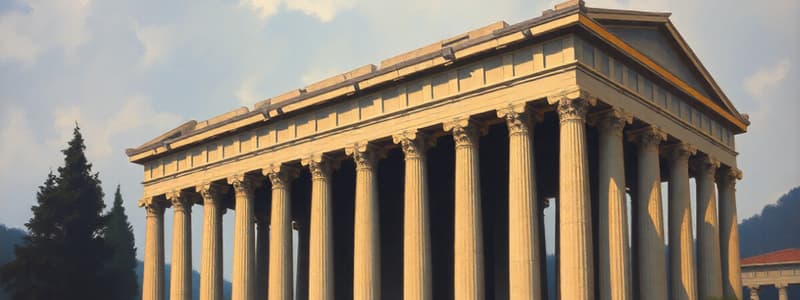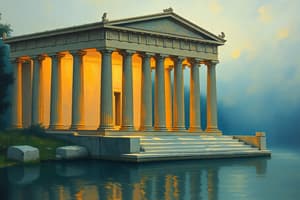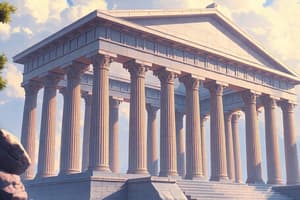Podcast
Questions and Answers
What was the primary purpose of Greek temples?
What was the primary purpose of Greek temples?
- Centers for community recreation
- Meeting places for congregation
- Places for political discussions
- Homes for the community’s god or goddess (correct)
Which order of architecture is characterized by being the sturdiest?
Which order of architecture is characterized by being the sturdiest?
- Corinthian
- Ionic
- Tuscan
- Doric (correct)
What architectural feature is described as being centrally located within the naos or cella of a Greek temple?
What architectural feature is described as being centrally located within the naos or cella of a Greek temple?
- The entrance
- The alter
- The cult image (correct)
- The roof structure
Which order is known for having a more delicate character reflecting the proportions of a woman?
Which order is known for having a more delicate character reflecting the proportions of a woman?
During which period did the transition from wooden columns to stone columns occur?
During which period did the transition from wooden columns to stone columns occur?
Where did the Doric order originate?
Where did the Doric order originate?
What was a common feature of Greek temple designs in relation to public ceremonies?
What was a common feature of Greek temple designs in relation to public ceremonies?
What inspired the transition to stone construction for Greek temples?
What inspired the transition to stone construction for Greek temples?
What shape describes the core of the Corinthian capital?
What shape describes the core of the Corinthian capital?
What was the primary purpose of the agora in Greek city planning?
What was the primary purpose of the agora in Greek city planning?
How did the design of the Corinthian capital cater to its visual appeal?
How did the design of the Corinthian capital cater to its visual appeal?
What does the term 'polis' refer to in ancient Greece?
What does the term 'polis' refer to in ancient Greece?
Which site was considered the spiritual core of Athens?
Which site was considered the spiritual core of Athens?
What eventually formed the streets around the Acropolis?
What eventually formed the streets around the Acropolis?
What characterized the growth of most Greek poleis?
What characterized the growth of most Greek poleis?
Which of the following statements about democracy in ancient Greece is true?
Which of the following statements about democracy in ancient Greece is true?
What is the primary purpose of the Temple of Athena Nike?
What is the primary purpose of the Temple of Athena Nike?
Which architectural order is the Temple of Athena Nike primarily associated with?
Which architectural order is the Temple of Athena Nike primarily associated with?
What significant event did the Parthenon replace after its destruction?
What significant event did the Parthenon replace after its destruction?
What materials were primarily used in the construction of the Parthenon?
What materials were primarily used in the construction of the Parthenon?
What is the dimension arrangement of columns in the Parthenon?
What is the dimension arrangement of columns in the Parthenon?
Who is believed to have supervised all the sculptures carved for the Parthenon?
Who is believed to have supervised all the sculptures carved for the Parthenon?
What is the visual refinement common to the Doric order seen in the Temple of Athena Nike?
What is the visual refinement common to the Doric order seen in the Temple of Athena Nike?
What does the sculptural frieze on the Temple of Athena Nike represent?
What does the sculptural frieze on the Temple of Athena Nike represent?
Which period in Greek history is associated with the establishment of political democracy and the rule of law?
Which period in Greek history is associated with the establishment of political democracy and the rule of law?
What was a significant factor preventing the consolidation of Greek city-states into a centralized nation?
What was a significant factor preventing the consolidation of Greek city-states into a centralized nation?
Which iconic monument from the Acropolis is highlighted as an architectural achievement of the Classic Period?
Which iconic monument from the Acropolis is highlighted as an architectural achievement of the Classic Period?
What natural disaster, particular to the Greek region, shaped its architectural and cultural responses?
What natural disaster, particular to the Greek region, shaped its architectural and cultural responses?
During which period did Greek art, philosophy, and literature become widely admired?
During which period did Greek art, philosophy, and literature become widely admired?
How was the agricultural economy of the Greeks primarily structured?
How was the agricultural economy of the Greeks primarily structured?
What characterized the environment in which Greek culture developed?
What characterized the environment in which Greek culture developed?
In what way did the environmental conditions affect Greek settlements?
In what way did the environmental conditions affect Greek settlements?
What term did the Greeks use to identify themselves collectively?
What term did the Greeks use to identify themselves collectively?
How did the geography of Greece influence its culture compared to Egypt?
How did the geography of Greece influence its culture compared to Egypt?
Which of the following was a characteristic of the Greek landscape?
Which of the following was a characteristic of the Greek landscape?
What major risk did the Greeks take that influenced their cultural development?
What major risk did the Greeks take that influenced their cultural development?
Which two civilizations are recognized in the Aegean during the second millennium?
Which two civilizations are recognized in the Aegean during the second millennium?
What was a common trait between the Minoan and Mycenaean civilizations?
What was a common trait between the Minoan and Mycenaean civilizations?
Which of the following geographic features significantly affected farming in Greece?
Which of the following geographic features significantly affected farming in Greece?
What motivated the Greeks to become adept at maritime activities?
What motivated the Greeks to become adept at maritime activities?
What did the metopes on the Acropolis commemorate?
What did the metopes on the Acropolis commemorate?
Which architectural order was chosen for the Erechtheion?
Which architectural order was chosen for the Erechtheion?
What feature distinguishes the eastern portico of the Erechtheion?
What feature distinguishes the eastern portico of the Erechtheion?
How is the caryatid porch of the Erechtheion designed?
How is the caryatid porch of the Erechtheion designed?
What was the purpose of the agora in Athens?
What was the purpose of the agora in Athens?
What historical significance does the site of the Erechtheion hold?
What historical significance does the site of the Erechtheion hold?
What architectural challenge did the designers of the Erechtheion face?
What architectural challenge did the designers of the Erechtheion face?
What do the caryatids symbolize in the context of the Erechtheion?
What do the caryatids symbolize in the context of the Erechtheion?
Flashcards
Hellenes
Hellenes
Ancient Greeks, regardless of their city-state affiliations, recognized themselves as a united people, sharing a common language and religion.
Hellas
Hellas
The land inhabited by the Ancient Greeks.
Greek Landscape
Greek Landscape
Ancient Greek landscape characterized by rough, mountainous terrain with numerous bays and coves.
Greek Seafaring
Greek Seafaring
Signup and view all the flashcards
Greek Culture
Greek Culture
Signup and view all the flashcards
Minoan Civilization
Minoan Civilization
Signup and view all the flashcards
Mycenaean Civilization
Mycenaean Civilization
Signup and view all the flashcards
Minoan and Mycenaean Legacy
Minoan and Mycenaean Legacy
Signup and view all the flashcards
The Archaic Period
The Archaic Period
Signup and view all the flashcards
The Classic Period
The Classic Period
Signup and view all the flashcards
The Hellenistic Period
The Hellenistic Period
Signup and view all the flashcards
The Acropolis
The Acropolis
Signup and view all the flashcards
The Agora
The Agora
Signup and view all the flashcards
The Greek Orders
The Greek Orders
Signup and view all the flashcards
The Tough Fiber of the Greeks
The Tough Fiber of the Greeks
Signup and view all the flashcards
Political Democracy
Political Democracy
Signup and view all the flashcards
Acropolis
Acropolis
Signup and view all the flashcards
Agora
Agora
Signup and view all the flashcards
Democracy in the Polis
Democracy in the Polis
Signup and view all the flashcards
Polis
Polis
Signup and view all the flashcards
Corinthian capital
Corinthian capital
Signup and view all the flashcards
Corinthian order
Corinthian order
Signup and view all the flashcards
Growth of Greek Cities
Growth of Greek Cities
Signup and view all the flashcards
Components of a Greek City
Components of a Greek City
Signup and view all the flashcards
What was the purpose of Greek temples?
What was the purpose of Greek temples?
Signup and view all the flashcards
What is the naos or cella?
What is the naos or cella?
Signup and view all the flashcards
How did the number of columns indicate a temple's importance?
How did the number of columns indicate a temple's importance?
Signup and view all the flashcards
Where did Greek temple ceremonies usually take place?
Where did Greek temple ceremonies usually take place?
Signup and view all the flashcards
What are the three main orders of Greek architecture?
What are the three main orders of Greek architecture?
Signup and view all the flashcards
Where did the three main orders of Greek architecture originate?
Where did the three main orders of Greek architecture originate?
Signup and view all the flashcards
How are the three orders of Greek architecture characterized?
How are the three orders of Greek architecture characterized?
Signup and view all the flashcards
Why did the Greeks use stone for columns during the Archaic period?
Why did the Greeks use stone for columns during the Archaic period?
Signup and view all the flashcards
What is the Acropolis?
What is the Acropolis?
Signup and view all the flashcards
What is the Erechtheion?
What is the Erechtheion?
Signup and view all the flashcards
What are Caryatids?
What are Caryatids?
Signup and view all the flashcards
Why is the Erechtheion complex?
Why is the Erechtheion complex?
Signup and view all the flashcards
Why are two different shrines in the Erechtheion?
Why are two different shrines in the Erechtheion?
Signup and view all the flashcards
What is the Ionic order?
What is the Ionic order?
Signup and view all the flashcards
What are the metopes of the Parthenon?
What are the metopes of the Parthenon?
Signup and view all the flashcards
What is the symbolism of the metopes?
What is the symbolism of the metopes?
Signup and view all the flashcards
Temple of Athena Nike
Temple of Athena Nike
Signup and view all the flashcards
Parthenon
Parthenon
Signup and view all the flashcards
What makes the Parthenon unusual?
What makes the Parthenon unusual?
Signup and view all the flashcards
The Parthenon's column arrangement
The Parthenon's column arrangement
Signup and view all the flashcards
Overall characteristics of the Parthenon
Overall characteristics of the Parthenon
Signup and view all the flashcards
Materials and Sculptural Decoration of the Parthenon
Materials and Sculptural Decoration of the Parthenon
Signup and view all the flashcards
A unique characteristic of the Temple of Athena Nike
A unique characteristic of the Temple of Athena Nike
Signup and view all the flashcards
The Propylaea
The Propylaea
Signup and view all the flashcards
Study Notes
Greek World - Chapter Outline
- Minoan and Mycenaean Greece
- The Archaic Period: The Greek Orders
- The Classical Period:
- The Acropolis
- The Agora
- The Hellenistic Period
Art, Philosophy and Democracy
- From the mid-18th century, Greek temples, statuary, and literature became admired as prime examples of art.
- The Golden Age of Athens saw the establishment of democracy and the rule of law.
- This coincided with the construction of iconic Acropolis monuments, including the Parthenon.
Greece: The Land of Mountains & Seas
- Greek geography is mountainous and rugged, with many bays and coves.
- Limited flat land made farming difficult.
- The sea was crucial for trade and travel.
- This led to an independent, dynamic culture, unlike the static culture of Egypt.
- The fragmented landscape contributed to independent city-states, rather than a unified nation.
### Greek Periods - Timelines and Key Structures
- Archaic Period (ca. 700-480 BCE): Includes the Temple of Poseidon at Isthmia, Socrates' birth, Paestum, Miletus, and the Second Temple of Solomon.
- Classical Period (ca. 480-323 BCE): Includes the Parthenon (447-438 BCE), Propylaea (ca. 435 BCE), Erechtheum (ca. 421-405 BCE), and Temple of Athena Nike (ca. 427 BCE).
- Hellenistic Period (ca. 323-31 BCE): Includes the Athenian Polias at Priene (334 BCE), Temple of Apollo at Didyma (ca. 313 BCE-41 CE), Sanctuary of Athena at Lindos (ca. 190 BCE).
Minoans and Knossos
- The Minoans, based on Crete, flourished in the second millennium BCE.
- They developed a maritime trading economy, linking economies of West Asia, Egypt, and parts of Europe.
- Their palace architecture, like Knossos, Phaestos, Mallia, and Zakros, differed significantly from Mesopotamian principles.
- Their culture was less concerned with defensive structures.
Mycenaean Civilization
- Settled in Greece around 2000 BCE.
- Developed a Bronze Age social order.
- Harbors and islands in the Peloponnese lent themselves to a system of regional chieftains.
- These were connected by blood, tribal loyalties, and language.
- Had a powerful fleet and controlled the Aegean islands.
Greek Temples
- Unlike modern churches, Greek temples were houses for deities.
- A cult image (statue) was housed within the naos (cella).
- Ceremonies typically took place outdoors.
- Specific patterns were followed, often reflecting the nature of the god or goddess.
- Variations were few, often reflecting the choice of a particular classical order, rather than new and novel design.
- Temples were characterized by grandeur and expense, often shown through the number of columns employed.
The Orders of Architecture
- The Doric, Ionic, Corinthian orders were developed during the Archaic Period.
- Influence from Egyptian precedents and technology prompted the transition from wooden to stone construction.
The Acropolis
- The Acropolis stood on a large limestone slab offering a sense of procession.
- Visitors entered through the Propylaea, encountering the statue of Athena close by.
- The Parthenon, centrally located, was visible from below and presented its grandeur while approaching.
Acropolis: Propylaea
- The Propylaea, a grand entrance gate to the Acropolis, was a Doric portico with two wings.
- The central distance between columns reflected the processional way.
- A second Doric portico ended the central section.
Acropolis: Temple of Athena Nike
- A simple sanctuary, dedicated to Athena Nike (goddess of victory),
- The temple was simple, and its Ionic columns reflected the Greek style.
- The building is relatively low compared to normal Ionic style, to align with the greater surrounding structures.
Acropolis: Parthenon
- The Parthenon was a substantial temple to the goddess Athena Parthenos (patron goddess) built during the Classical period.
- Built on the site of an older Parthenon, destroyed by the Persians.
- Features elaborate sculpture on its pediments and metopes.
Acropolis: Erechtheion
- The Erechtheion is a complex temple that adapts to the uneven nature of its site.
- The style was Ionic, with multiple porches on its frontages and a distinct level difference.
Agora
- The Agora served as Athens' business and discussion hub.
- It housed courts, meeting places and political functions.
- Stoas provided protection from the elements.
- The Bouleuterion was the council meeting hall.
Theatres
- Greek theatres were open-air structures, integrated into the landscape and acoustically designed for optimal sound
- They included a seating area (theatron), a performance space (orchestra), and a backdrop (skene).
- The theatre at Epidauros could seat up to 14,000 people.
Hellenistic Period
- Marked by the reign of Alexander the Great.
- Characterized by a shift from strict Classical traditions to a more elaborate and ornate style.
- The Doric order diminished, while the Ionic style became more popular, reflecting the influence of the orient.
- Sculptural ornamentation was meticulous and coordinated, but metopes and triglyphs were avoided to simplify carving.
- Hellenistic city planning embraced asymmetry and evolution.
Temple of Apollo Epicurius
- This temple features all three architectural orders,
- The use of each order in this temple is unusual based on the common Greek conventions.
Tholos
- A circular building, often associated with religious or civic purposes.
- The tholos at Epidauros was approximately 72 feet in diameter.
- External Doric columns and internal Corinthian columns were used in conjunction with specific floor designs in the structure
Hellenistic Cities
- Hippodamus of Miletus influenced city planning in the Hellenistic period.
- Towns like Priene focused on grid-based layouts with evenly proportioned designs
Studying That Suits You
Use AI to generate personalized quizzes and flashcards to suit your learning preferences.




